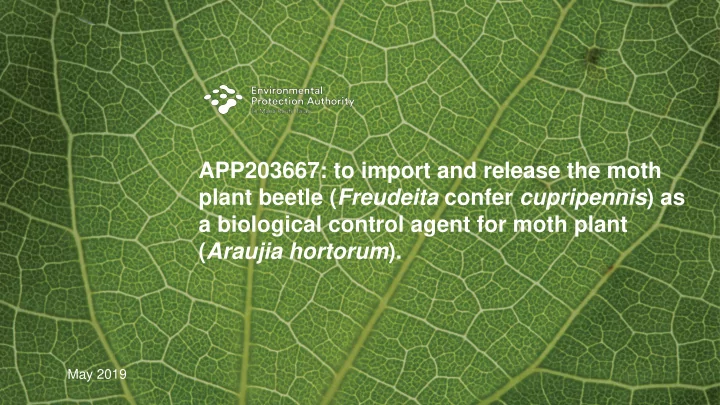

APP203667: to import and release the moth plant beetle ( Freudeita confer cupripennis ) as a biological control agent for moth plant ( Araujia hortorum ). May 2019
The application 2 Waikato Regional Council The EPA received 53 submissions: • 23 support, • 4 neither supported nor opposed, and • 26 opposed the application. Seven submitters indicated they wish to present their submissions at a hearing.
3 Freudeita cf. cupripennis Araujia hortorum Moth plant beetle Moth plant
4 Moth plant Native to South America invasive weed Introduced in 1880s Poisonous Various habitats Intolerant to frost No quantitative data Moth plant observation
Risk/Benefits assessment 5 We assessed the risks and benefits of bringing the moth plant beetle into New Zealand, assuming the successful establishment of self-sustaining populations. We assessed the risks and benefits to: • the environment, • market economy, • people and communities, • public health, and • Māori and their relationship with the environment.
Environment 6 Reduced use of herbicides: • Only small quantity Benefits • Broad spectrum herbicides used to control other weeds Improved biodiversity: • Emergence and establishment of native plants • Reduce seedling • Access hard to reach populations • Increase time allocated to control other weeds • Reduce adverse impact on insects We concluded that moth plant beetle could have significant environmental benefits.
Economy 7 Reduce the cost to control moth plant • Difficult to determine Benefits • Vary according to the status of the weed and the degree of infestation Reduce impact on orchards Increase biodiversity and conservation values We concluded that the introduction of the BCA would have a negligible economic impact.
Public health 8 Reduced contact with poisonous plant Benefits Decreased infestation of new areas We assessed that the decrease of moth plant populations is likely to have a low impact as human exposure to the noxious weed remains rare.
People and communities 9 Require time and effort Reduce the enjoyment of the natural environment Benefits Demotivate volunteers We concluded that the level of benefits to the community would be low.
Environment 10 Impact on native plants: • Parsonsia , 3 native species • 2 included in the host-range testing Risks Effect on food-webs: • No specialist moth plant feeding insects • New source of food • Hybridisation We concluded that the release of the BCA would have a negligible impact on the environment.
Economy 11 Impact on exotic ornamental plants: • Reduce value to the nursery industry Risks • Tweedia targeted by moth plant beetle • No high economic value, not widely grown • Protect with pesticides The overall level of risks on New Zealand’s market economy is negligible.
People and communities 12 Loss of enjoyment for the public Reduction of food for monarch butterfly (Tweedia) Risks The overall level of risks on people and communities from the release of F. cf. cupripennis is assessed to be negligible.
Summary of our assessment 13 Keys areas Conclusion Environment Significant Benefits Economy Negligible Public health Low People and communities Low Environment Negligible Risks Economy Negligible People and communities Negligible
Relationship of Māori to the Environment 14 Kaupāpa Kura Taiao considered that the application provides sufficient information The release of F. cf. cupripennis is likely to be acceptable in terms of Māori cultural beliefs and environmental frameworks. Minimum standards The biological control agent meets the minimum standards.
Recommendation 15 Our assessment has found that the benefits of releasing Freudeita cf cupripennis outweigh any identified risks or costs. We therefore recommend that the application be approved.
For more information contact: General enquiries Phone +64 4 916 2426 Fax +64 4 914 0433 info@epa.govt.nz
Recommend
More recommend